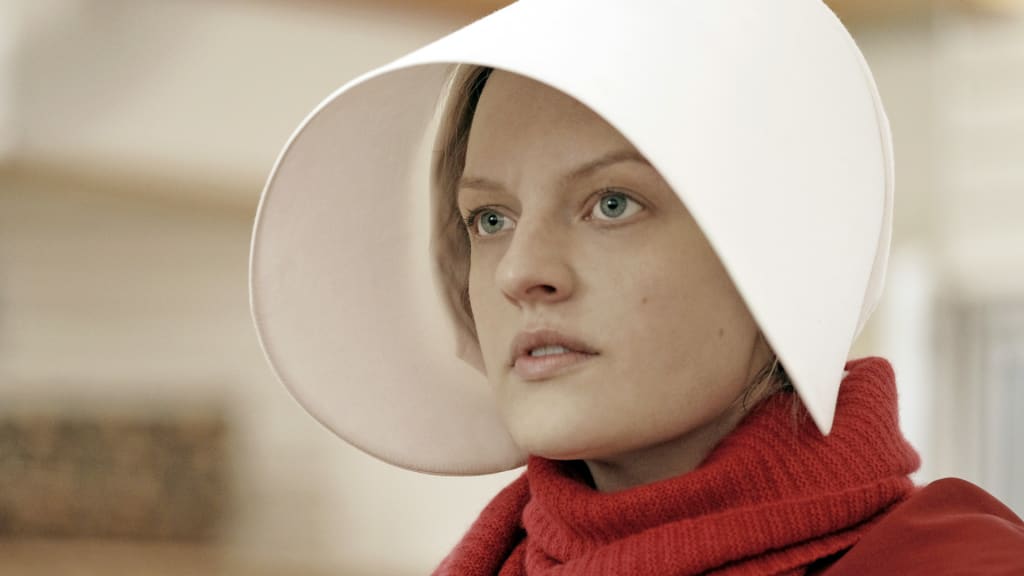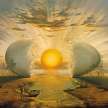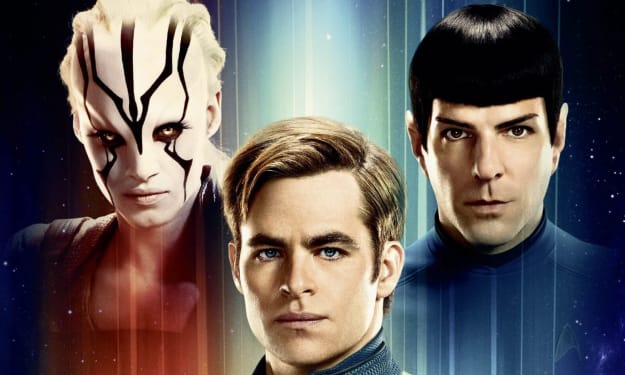Best Political Sci-Fi Books
Whether about artificial intelligence or an ancient alien race, the best political sci-fi books are just a small glimmer into the near future of diplomacy.

Science fiction tends to draw on tropes from other genres, like space westerns and futuristic horrors. As such, a political science fiction novel often argues either for or against government rule, most often than not the former. This will oftentimes deal with utopias of some kind (that which turn into dystopias as you read), futuristic technology, diplomatic space travel, and extraterrestrial foreign affairs. These are only minuscule parts of what make a poli-sci-fi book truly encapsulating.
You'd actually be astonished at how many different political sci-fi books are out there, and many of them you have probably already read before. These stories capture the essence of diplomacy in worlds long forgotten, destroyed, or enriched by an untimely design that inevitably led to their demise. These are the very best political sci-fi books, and there's no need to raise a futuristic campaign to prove it. Some may even show signs we're already living in a dystopian society, but I say to leave that for the media to decide.
The quintessential political science fiction and dystopian novel is, hands down, 1984. With its striking closeness in portrayal to the real world and the essence of complete disparity hidden under the surface of the plot, Orwell’s classic is an undeniable addition to the best political sci-fi books of all time.
Readers will join alongside Winston Smith of Airstrip One, a province of Oceania, which was once Great Britain. Smith, a byproduct of the era, seems to grow skeptical as the plot thickens as to the nature of his existence under the fleeting corruption handed down by Big Brother, the controlling Party of the new world. This dystopian masterpiece will send goosebumps down your spine even after your second read through; it’s so good you have to experience it twice, or more.
The Handmaid's Tale is one of the best political sci-fi books, possibly even among the top five of all science fiction novels, and gave Atwood her claim to fame. The characters and symbolism are so representative of modern social views are key pieces of insight in this dystopian novel. This book even won the very first Arthur C. Clarke award in 1987.
Meet Offred, a handmaid in the Republic of Gilead, where women aren't allowed to read and maids must pray once a month that their Commander gets them pregnant. The book flirts with themes of women's suffrage and controlled feminist thought. Widely popular within the science fiction community, The Handmaid's Tale is an interesting look into how gender bias can greatly fuel the downfall of society.
This interesting retrospective on the aftermath of the second World War expertly brings out the connotations of prejudice and racism so associated by the mid-20th century. Philip K. Dick writes a historical fiction based on the intriguing idea that the Nazis had won the war and now occupy America jointly with Japan.
It's one of the best political sci-fi books of its time, because it draws on the particular apocalyptic sentiments that surrounded the era. This is America circa 1962, a dysfunctional period that still supports slavery and world domination. Jews are in hiding, or have changed their names to blend into society, while the I Ching breeds all over in San Francisco. The Man in the High Castle is a timeless classic that will keep you spellbound until its very last page.
In Jennifer Government, the US as we know it has greatly evolved into something far more progressive, yet sinister in this alternate history drawn by Max Barry. The second novel in his series of science fiction thrillers, Jennifer Government is one of the best political sci-fi books, for it captures a scary, hyper-commercial world filled with deregulated industry and globalized trade.
In the novel, citizens of this whacky world must take on the name of the company they work for, as in the case of Jennifer Government, who works for the state as an agent investigating a series of multiple murders. After discovering the plot to be the work of Nike, Jennifer falls into a warped plot that may go beyond what anyone ever thought possible. It's an interesting tale that really makes you sit and think about your contemporary place in society.
Ever wondered what would happen if we populated the moon? In Ian McDonald’s Luna, this very idea comes to life bearing a host of ranging issues, from international relations, to political domain. As one of the world's best political sci-fi books, Luna shows us the bounds we will go to leave our human footprint on the galactic neighborhood abound.
Adriana Corta has built an entire empire on our closest satellite and officially names herself head of the Moon's Helium-3 industry. Further into her tenure, Corta begins to see areas of fault within the company’s internal and external components. The bounds of power and ruthlessness are key concepts that make Luna such an entrancing novel to dive into, just be prepared for some extremely realistic possibilities to behold.
Regulated by the "Table of Hours," the United State (yes, one entity) has been brittled down into a numerical community built on governed actions and rules associated by design, not freedom. Comprised of he- and she-Numbers, the United State breathes in an atmosphere of materialism and collective thought.
Zamyatin's timeless classic still sends shivers down our spine in every read through with its spellbinding closeness to reality and the unprecedented realms of independence. Since it was such an extreme inspiration for Orwell's 1984 and Brave New World, this book is one of the best political sci-fi books.
SpaceX and the journey to Mars is only just around the corner, yet The Lights in the Sky Are Stars seemingly captures the space opera of these interstellar movements much earlier than our actual reality. Frederic Brown's classic tale of our futuristic trip to Mars and the avenues with which space flight can lead us truly captures our imagination. It's one of the best political sci-fi book for bringing out the political nature so involved with our coming era.
Protagonist Max Andrews lives on Mars. Though it's a happy, peaceful place, Max isn't happy or peaceful. He's killed, he's stolen, and he's grown tired of the starry, dust filled planet. No, he's got bigger plans. Max intends to hitch a ride on America's rocket, soon planned to head up into the stars. Nothing is stopping him from reaching his final goal: space.
Inventor of the atomic bomb, Dr. Felix Hoenikker is idolized for his work on a new chemical compound that can freeze the entire planet. It's called 'ice-nine,' but what it can be used for, other than total world annihilation, as well as its true potential are as of yet unknown. Plus, the whereabouts of both Hoenikker and his chemical ingredients are also lost, and the only way to save the planet from another ice age is by finding them both.
Journey through a whacky time-scape of random hilarity, brutal irony, and cunning storytelling. It's a world with no rules, completely listless and open for practically anything, which makes it so entertaining. Vonnegut is one of the few masters of the craft and, with Cat's Cradle, he's successfully made one of the best political sci-fi books of all time.
Genevieve Valentine isn't a household name like most of the other authors on this list. Still, Persona, her breakout novel, is one of the best political sci-fi books for its adaptability and realistic sense of the future. Her world in this book is unlike anything you have ever seen before.
This near-future thriller weaves international politics into the dystopian concept beautifully through the character of Suyana. Living in a world strictly governed by the "Faces," an international assembly dedicated to a specific representation on Earth, Suyana works as the Face of the United Amazonia Rainforest Confederation. As she attempts to court the help of the United States, Suyana is fired upon by assassins and must run for her life while trying to find the potential killer.
This dystopian novel by Aldous Huxley may have been on your high school reading list, and if so, then you've read one of the best political sci-fi books on the market. Brave New World, the title of which was taken from Shakespeare's The Tempest, is unlike any science fiction book you've ever read in the past.
London is the World State in AD 2540, wherein people are bio-engineered in artificial wombs and children are bred contingent on their level of intellect and labor. Bernard Max, a psychologist with an inferiority complex, due to his short height, must overcome the boundaries set by his government, while unlocking the truths of sleep-learning.
Third in his Thousand Cultures series, John Barnes' The Merchants of Souls delves deep into the psyche of special agent Giraut Leones, who's lost most of his friends and acquaintances due to their untrustworthy actions. Called back into the Office of Special Projects after having sworn away from it, Giraut gets pulled down into a void of trickling crime.
While Barnes is an untimely master of the contemporary science fiction model, The Merchants of Souls expertly draws on the near future sense of government and authority in the face of otherworldly suspicions, and making this one of the best political sci-fi books to read.
About the Creator
Salvador Lorenz
Thinking in nodes of progress, futurism, science, culture, and existence. I experience life in a number of ways, pertaining to mathematical concepts mixed with rich flavors of art.






Comments
There are no comments for this story
Be the first to respond and start the conversation.